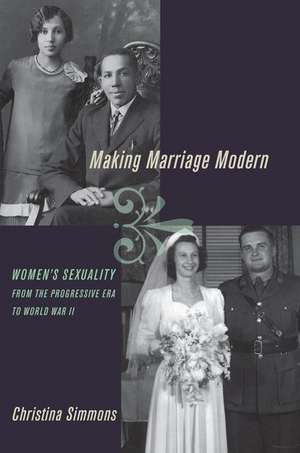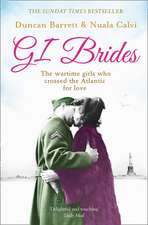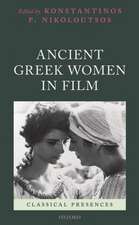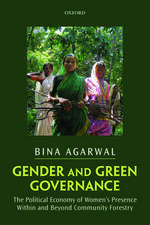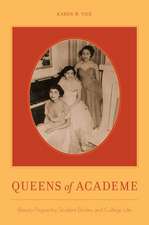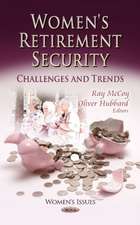Making Marriage Modern: Women's Sexuality from the Progressive Era to World War II: Studies in the History of Sexuality
Autor Christina Simmonsen Limba Engleză Paperback – 26 ian 2012
| Toate formatele și edițiile | Preț | Express |
|---|---|---|
| Paperback (1) | 281.20 lei 31-37 zile | |
| Oxford University Press – 26 ian 2012 | 281.20 lei 31-37 zile | |
| Hardback (1) | 329.89 lei 31-37 zile | |
| Oxford University Press – 23 apr 2009 | 329.89 lei 31-37 zile |
Preț: 281.20 lei
Nou
Puncte Express: 422
Preț estimativ în valută:
53.81€ • 56.32$ • 44.78£
53.81€ • 56.32$ • 44.78£
Carte tipărită la comandă
Livrare economică 20-26 martie
Preluare comenzi: 021 569.72.76
Specificații
ISBN-13: 9780199874033
ISBN-10: 0199874034
Pagini: 320
Ilustrații: 9 hts
Dimensiuni: 156 x 234 x 17 mm
Greutate: 0.45 kg
Editura: Oxford University Press
Colecția OUP USA
Seria Studies in the History of Sexuality
Locul publicării:New York, United States
ISBN-10: 0199874034
Pagini: 320
Ilustrații: 9 hts
Dimensiuni: 156 x 234 x 17 mm
Greutate: 0.45 kg
Editura: Oxford University Press
Colecția OUP USA
Seria Studies in the History of Sexuality
Locul publicării:New York, United States
Recenzii
If you imagine that it took the sexual revolution of the 1960s to rumple the marriage bed, read this book--a very revealing, serious, and highly useful study of changes in thinking about sex and marriage before World War II.
In this important book, Christina Simmons insightfully examines the ideas and impact of intellectuals, novelists, advice writers, reformers, and radicals who forged a new vision of marital sexuality in the early twentieth century. In so doing, she illuminates the range of views--about heterosexual companionship, sexual knowledge, and female independence--that made marriage modern in the 1920s and 1930s, and continue to shape attitudes to the present day.
In a carefully researched and crisply written account, Simmons reconstructs debates--about sex for pleasure, privacy for couples, and equality for women--that still have relevance for us today. A smart, engaging, and important book.
Challenging both the myth of Victorian repression and the notion that it took women's liberation to transform the institution of marriage, Christina Simmons traces profound changes in sexual and marital relations from the 1910s through the 1940s. She analyzes debates over intimacy, privacy, freedom, and reciprocity among reformers, intellectuals, sex radicals, educators, therapists, physicians, novelists, and playwrights. Deeply researched and lucidly argued, Making Marriage Modern changes the terrain for all future discussions of marriage in the twentieth century.
Simmons' complex interpretation of white and African American sources maps a range of competing sexual ideals. Grounded in sex advice literature, marriage manuals, and reform tracts, this book will fascinate readers and provide important perspectives on contemporary debates over sex education, reproductive rights, and the changing definition of marriage.
In this important book, Christina Simmons insightfully examines the ideas and impact of intellectuals, novelists, advice writers, reformers, and radicals who forged a new vision of marital sexuality in the early twentieth century. In so doing, she illuminates the range of views--about heterosexual companionship, sexual knowledge, and female independence--that made marriage modern in the 1920s and 1930s, and continue to shape attitudes to the present day.
In a carefully researched and crisply written account, Simmons reconstructs debates--about sex for pleasure, privacy for couples, and equality for women--that still have relevance for us today. A smart, engaging, and important book.
Challenging both the myth of Victorian repression and the notion that it took women's liberation to transform the institution of marriage, Christina Simmons traces profound changes in sexual and marital relations from the 1910s through the 1940s. She analyzes debates over intimacy, privacy, freedom, and reciprocity among reformers, intellectuals, sex radicals, educators, therapists, physicians, novelists, and playwrights. Deeply researched and lucidly argued, Making Marriage Modern changes the terrain for all future discussions of marriage in the twentieth century.
Simmons' complex interpretation of white and African American sources maps a range of competing sexual ideals. Grounded in sex advice literature, marriage manuals, and reform tracts, this book will fascinate readers and provide important perspectives on contemporary debates over sex education, reproductive rights, and the changing definition of marriage.
Notă biografică
Associate Professor of History and Women's Studies, University of Windsor
